 |
yumapro
25.10-4
YumaPro SDK
|
 |
yumapro
25.10-4
YumaPro SDK
|
Configuration segments are stored in sequential order. More...

Data Structures | |
| struct | cfg_template_t |
| struct representing 1 configuration database More... | |
Typedefs | |
| typedef void(* | cfg_reload_candidate_cb_t) (void) |
| support for server callback anytime the candidate config is reloaded from the running config <discard-changes> | |
Enumerations | |
| enum | cfg_state_t { CFG_ST_NONE , CFG_ST_INIT , CFG_ST_READY , CFG_ST_PLOCK , CFG_ST_FLOCK , CFG_ST_CLEANUP } |
| current configuration state More... | |
| enum | cfg_source_t |
| classify the config source | |
| enum | cfg_location_t |
| classify the config location | |
Functions | |
| void | cfg_ypinit (void) |
| Initialize the config manager. More... | |
| void | cfg_clean_roots (void) |
| Cleanup the cfg->root nodes before all the objects are freed. More... | |
| void | cfg_cleanup (void) |
| Cleanup the config manager. More... | |
| status_t | cfg_rwlock_rdlock (thd_tcb_t *tcb, cfg_template_t *cfg) |
| Take out the read lock associated with a cfg (datastore) RWLOCK structure May be called recursively. More... | |
| status_t | cfg_rwlock_wrlock (thd_tcb_t *tcb, cfg_template_t *cfg) |
| Take out a write lock associated with a cfg (datastore) RWLOCK structure. More... | |
| status_t | cfg_rwlock_unlock (thd_tcb_t *tcb, cfg_template_t *cfg) |
| Release a lock associated with a cfg (datastore) RWLOCK structure. More... | |
| status_t | cfg_rwlock_init_req_locks (thd_tcb_t *tcb) |
| Initialize TCB multiple lock structure. More... | |
| status_t | cfg_rwlock_release_all_locks (thd_tcb_t *tcb) |
| Release all RWLOCKs recorded in TCB lock state structure. More... | |
| status_t | cfg_rwlock_acquire_locks (thd_tcb_t *tcb) |
| Acquire multiple locks in order to help prevent deadlock. More... | |
| status_t | cfg_rwlock_acquire_lock_pair (thd_tcb_t *tcb, cfg_template_t *cfg1, boolean wrlock1, cfg_template_t *cfg2, boolean wrlock2) |
| Acquire multiple (2) locks in predetermined, repeatable in order to help prevent deadlock. More... | |
| status_t | cfg_rwlock_acquire_single_lock (thd_tcb_t *tcb, cfg_template_t *cfg, boolean wrlock) |
| Acquire a single RWLOCK. More... | |
| status_t | cfg_rwlock_acquire_single_rdlock (thd_tcb_t *tcb, cfg_template_t *cfg) |
| Acquire a single RWLOCK for read access. More... | |
| status_t | cfg_rwlock_acquire_single_wrlock (thd_tcb_t *tcb, cfg_template_t *cfg) |
| Acquire a single RWLOCK for write access. More... | |
| status_t | cfg_init_static_db (ncx_cfg_t cfg_id) |
| Initialize the specified static configuration slot. More... | |
| cfg_template_t * | cfg_new_template (const xmlChar *name, ncx_cfg_t cfg_id) |
| Malloc and initialize a cfg_template_t struct. More... | |
| void | cfg_free_template (cfg_template_t *cfg) |
| Clean and free the cfg_template_t struct. More... | |
| void | cfg_set_state (ncx_cfg_t cfg_id, cfg_state_t new_state) |
| Change the state of the specified static config. More... | |
| cfg_state_t | cfg_get_state (ncx_cfg_t cfg_id) |
| Get the state of the specified static config. More... | |
| cfg_template_t * | cfg_get_config (const xmlChar *cfgname) |
| Get the config struct from its name. More... | |
| const xmlChar * | cfg_get_config_name (ncx_cfg_t cfgid) |
| Get the config name from its ID. More... | |
| cfg_template_t * | cfg_get_config_id (ncx_cfg_t cfgid) |
| Get the config struct from its ID. More... | |
| void | cfg_set_target (ncx_cfg_t cfg_id) |
| Set the CFG_FL_TARGET flag in the specified config. More... | |
| status_t | cfg_fill_candidate_from_running (ses_id_t sesid) |
| Fill the <candidate> config with the config contents of the <running> config. More... | |
| status_t | cfg_fill_candidate_from_startup (ses_id_t sesid) |
| Fill the <candidate> config with the config contents of the <startup> config. More... | |
| status_t | cfg_fill_candidate_from_inline (ses_id_t sesid, val_value_t *newroot) |
| Fill the <candidate> config with the config contents of the <config> inline XML node. More... | |
| status_t | cfg_fill_operational_from_running (ses_id_t sesid) |
| Fill the <operational> config with the config contents of the <running> config. More... | |
| void | cfg_set_dirty_flag (cfg_template_t *cfg) |
| Mark the config as 'changed'. More... | |
| void | cfg_clear_dirty_flag (cfg_template_t *cfg) |
| Clear the cfg dirty flag upon request. More... | |
| void | cfg_clear_running_dirty_flag (void) |
| Clear the running dirty flag when it is saved to NV-storage or loaded into running from startup. More... | |
| void | cfg_clear_candidate_dirty_flag (void) |
| Clear the candidate dirty flag when it is saved to NV-storage or loaded into running from startup. More... | |
| boolean | cfg_get_dirty_flag (const cfg_template_t *cfg) |
| Get the config dirty flag value. More... | |
| status_t | cfg_ok_to_lock (const cfg_template_t *cfg) |
| Check if the specified config can be locked right now for global lock only. More... | |
| status_t | cfg_ok_to_unlock (const cfg_template_t *cfg, ses_id_t sesid) |
| Check if the specified config can be unlocked right now by the specified session ID; for global lock only. More... | |
| status_t | cfg_ok_to_unlock2 (const cfg_template_t *cfg, ses_id_t sesid, boolean lockall) |
| Check if the specified config can be unlocked right now by the specified session ID; for global lock only. More... | |
| status_t | cfg_ok_to_read (const cfg_template_t *cfg) |
| Check if the specified config can be read right now. More... | |
| status_t | cfg_ok_to_write (const cfg_template_t *cfg, ses_id_t sesid) |
| Check if the specified config can be written right now by the specified session ID. More... | |
| boolean | cfg_is_global_locked (const cfg_template_t *cfg) |
| Check if the specified config has ab active global lock. More... | |
| boolean | cfg_is_partial_locked (const cfg_template_t *cfg) |
| Check if the specified config has any active partial locks. More... | |
| status_t | cfg_get_global_lock_info (const cfg_template_t *cfg, ses_id_t *sesid, const xmlChar **locktime) |
| Get the current global lock info. More... | |
| status_t | cfg_lock (cfg_template_t *cfg, ses_id_t locked_by, cfg_source_t lock_src) |
| Lock the specified config. More... | |
| status_t | cfg_lock2 (cfg_template_t *cfg, ses_id_t locked_by, cfg_source_t lock_src, boolean lockall) |
| Lock the specified config (with lockall) More... | |
| status_t | cfg_unlock (cfg_template_t *cfg, ses_id_t locked_by) |
| Unlock the specified config. More... | |
| status_t | cfg_unlock2 (cfg_template_t *cfg, ses_id_t locked_by, boolean lockall) |
| Unlock the specified config (2nd rev) More... | |
| status_t | cfg_unlock_ex (cfg_template_t *cfg, ses_id_t locked_by, boolean skip_reload) |
| Unlock the specified config. More... | |
| void | cfg_release_locks (ses_id_t sesid) |
| Release any configuration locks held by the specified session. More... | |
| void | cfg_release_partial_locks (ses_id_t sesid) |
| Release any configuration locks held by the specified session. More... | |
| void | cfg_get_lock_list (ses_id_t sesid, val_value_t *retval) |
| Get a list of all the locks held by a session. More... | |
| void | cfg_apply_load_root (cfg_template_t *cfg, val_value_t *newroot) |
| Apply the AGT_CB_APPLY function for the OP_EDITOP_LOAD operation. More... | |
| void | cfg_update_last_ch_time (cfg_template_t *cfg, time_t *timestamp) |
| Update the last-modified timestamp. More... | |
| void | cfg_update_last_txid (cfg_template_t *cfg, ncx_transaction_id_t txid) |
| Update the last good transaction ID. More... | |
| void | cfg_update_stamps (cfg_template_t *source, cfg_template_t *dest) |
| Update the last-modified and last-txid stamps. More... | |
| const xmlChar * | cfg_get_last_ch_time (cfg_template_t *cfg) |
| Get the last-modified timestamp. More... | |
| ncx_transaction_id_t | cfg_get_last_txid (cfg_template_t *cfg) |
| Get the last good transaction ID. More... | |
| status_t | cfg_sprintf_etag (cfg_template_t *cfg, xmlChar *buff, int32 buffsize) |
| Write the Entity Tag for the datastore to the specified buffer. More... | |
| status_t | cfg_sprintf_etag_id (ncx_transaction_id_t id, xmlChar *buff, int32 buffsize) |
| Write the Entity Tag for the datastore to the specified buffer Use the last_id instead of the cfg template. More... | |
| status_t | cfg_add_partial_lock (cfg_template_t *cfg, plock_cb_t *plcb) |
| Add a partial lock the specified config. More... | |
| plock_cb_t * | cfg_find_partial_lock (cfg_template_t *cfg, plock_id_t lockid) |
| Find a partial lock in the specified config. More... | |
| plock_cb_t * | cfg_first_partial_lock (cfg_template_t *cfg) |
| Get the first partial lock in the specified config. More... | |
| plock_cb_t * | cfg_next_partial_lock (plock_cb_t *curplockcb) |
| Get the next partial lock in the specified config. More... | |
| void | cfg_delete_partial_lock (cfg_template_t *cfg, plock_id_t lockid) |
| Remove a partial lock from the specified config. More... | |
| status_t | cfg_ok_to_partial_lock (const cfg_template_t *cfg) |
| Check if the specified config can be locked right now for partial lock only. More... | |
| val_value_t * | cfg_get_root (ncx_cfg_t cfgid) |
| Get the config root for the specified config. More... | |
| status_t | cfg_setup_datastore_root (ncx_cfg_t cfgid) |
| Setup the running config root if load_running_config did not add anything. More... | |
| void | cfg_register_reload_candidate_cb (cfg_reload_candidate_cb_t cbfn) |
| Register a callback function to be called anytime the. More... | |
| const xmlChar * | cfg_get_startup_filespec (void) |
| Get the filespec string for the XML file to save the running database. More... | |
| boolean | cfg_running_is_wrlocked (void) |
| Check if the running datastore is currently pthreads write-locked. More... | |
| boolean | cfg_candidate_is_wrlocked (void) |
| Check if the candidate datastore is currently pthreads write-locked. More... | |
| boolean | cfg_operational_is_wrlocked (void) |
| Check if the operational datastore is currently pthreads write-locked. More... | |
| cfg_template_t * | cfg_new_fake_candidate (const xmlChar *name, ncx_cfg_t cfg_id) |
| Malloc and initialize a new fake Candidate cfg_template_t struct. More... | |
| cfg_template_t * | cfg_new_fake_candidate2 (const xmlChar *name, ncx_cfg_t cfg_id, val_value_t *fake_root) |
| Malloc and initialize a new fake Candidate with fake_root. More... | |
| void | cfg_set_defer_load (boolean val) |
| Set the config defer load flag to the config. More... | |
| time_t | cfg_get_lock_itime (ncx_cfg_t cfg_id) |
| Get the lock_itime field. More... | |
| status_t | cfg_lock_hold_timeout (ncx_cfg_t cfg_id, ses_id_t locked_by, boolean skip_reload) |
| Force a cfg lock to be undone due to max-lock-hold-time. More... | |
Configuration segments are stored in sequential order.
Configuration database (running, candidate, startup, etc.)
+
|
+-- (root: /)
+
|
+--- object X (netconf, security, routing, etc.)
| |
| +---- object A , B, C
|
+--- object Y
| |
| +---- object D , E
V
MODULE USAGE
============
1) call cfg_ypinit()
2) call cfg_init_static_db for the various hard-wired databases
that need to be created by the agent
3) call cfg_apply_load_root() with the startup database contents
to load into the running config
4) call cfg_set_target() [NCX_CFGID_CANDIDATE or NCX_CFGID_RUNNING]
4a) call cfg_fill_candidate_from_running if the target is candidate;
after agt.c/load_running_config is called
5) call cfg_set_state() to setup config db access, when ready
for NETCONF operations
6) Use cfg_ok_to_* functions to test config access
7) use cfg_lock and cfg_unlock as desired to set global write locks
8) use cfg_release_locks when a session terminates
9) call cfg_cleanup() when program is terminating
| enum cfg_state_t |
| status_t cfg_add_partial_lock | ( | cfg_template_t * | cfg, |
| plock_cb_t * | plcb | ||
| ) |
Add a partial lock the specified config.
This will not really have an effect unless the CFG_FL_TARGET flag in the specified config is also set For global lock only
| cfg | Config template to lock |
| plcb | partial lock control block, already filled out, to add to this configuration |

| void cfg_apply_load_root | ( | cfg_template_t * | cfg, |
| val_value_t * | newroot | ||
| ) |
Apply the AGT_CB_APPLY function for the OP_EDITOP_LOAD operation.
| cfg | config target |
| newroot | new config tree |


| boolean cfg_candidate_is_wrlocked | ( | void | ) |
Check if the candidate datastore is currently pthreads write-locked.
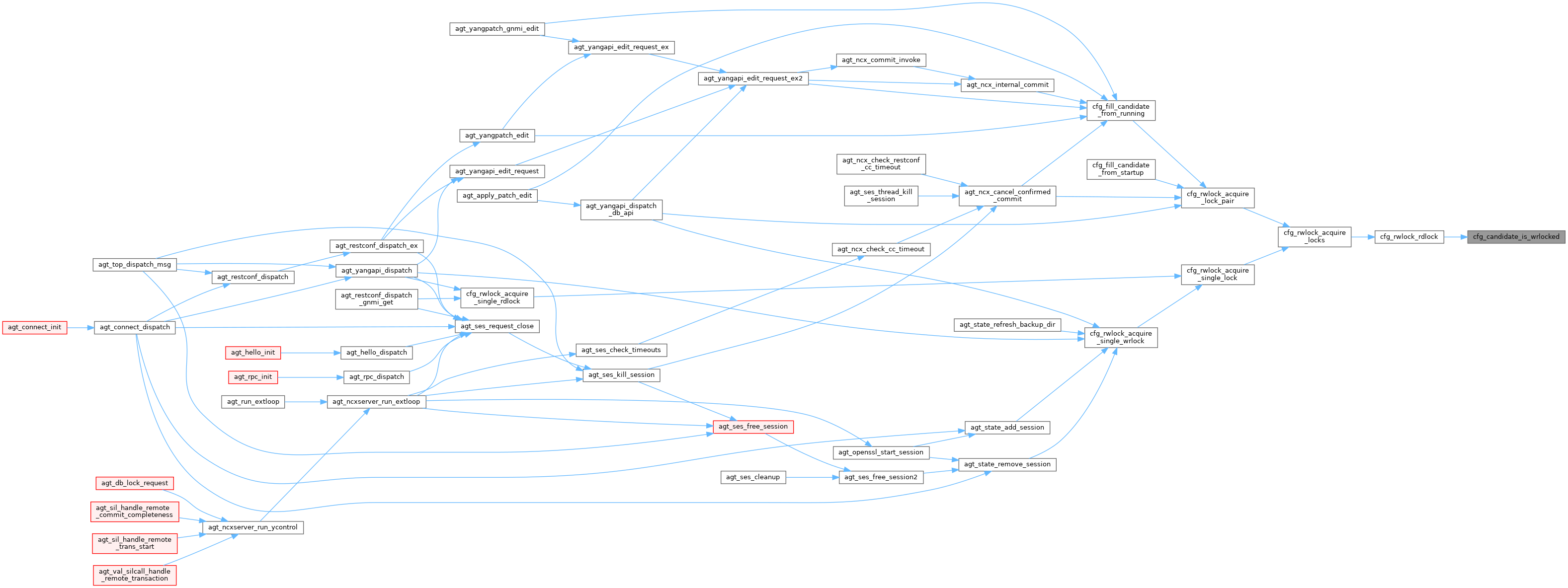
| void cfg_clean_roots | ( | void | ) |
Cleanup the cfg->root nodes before all the objects are freed.

| void cfg_cleanup | ( | void | ) |
Cleanup the config manager.

| void cfg_clear_candidate_dirty_flag | ( | void | ) |
Clear the candidate dirty flag when it is saved to NV-storage or loaded into running from startup.


| void cfg_clear_dirty_flag | ( | cfg_template_t * | cfg | ) |
Clear the cfg dirty flag upon request.
| cfg | pointer to valid config template |

| void cfg_clear_running_dirty_flag | ( | void | ) |
Clear the running dirty flag when it is saved to NV-storage or loaded into running from startup.


| void cfg_delete_partial_lock | ( | cfg_template_t * | cfg, |
| plock_id_t | lockid | ||
| ) |
Remove a partial lock from the specified config.
| cfg | Config template to use |
| lockid | lock-id for the plcb to remove |
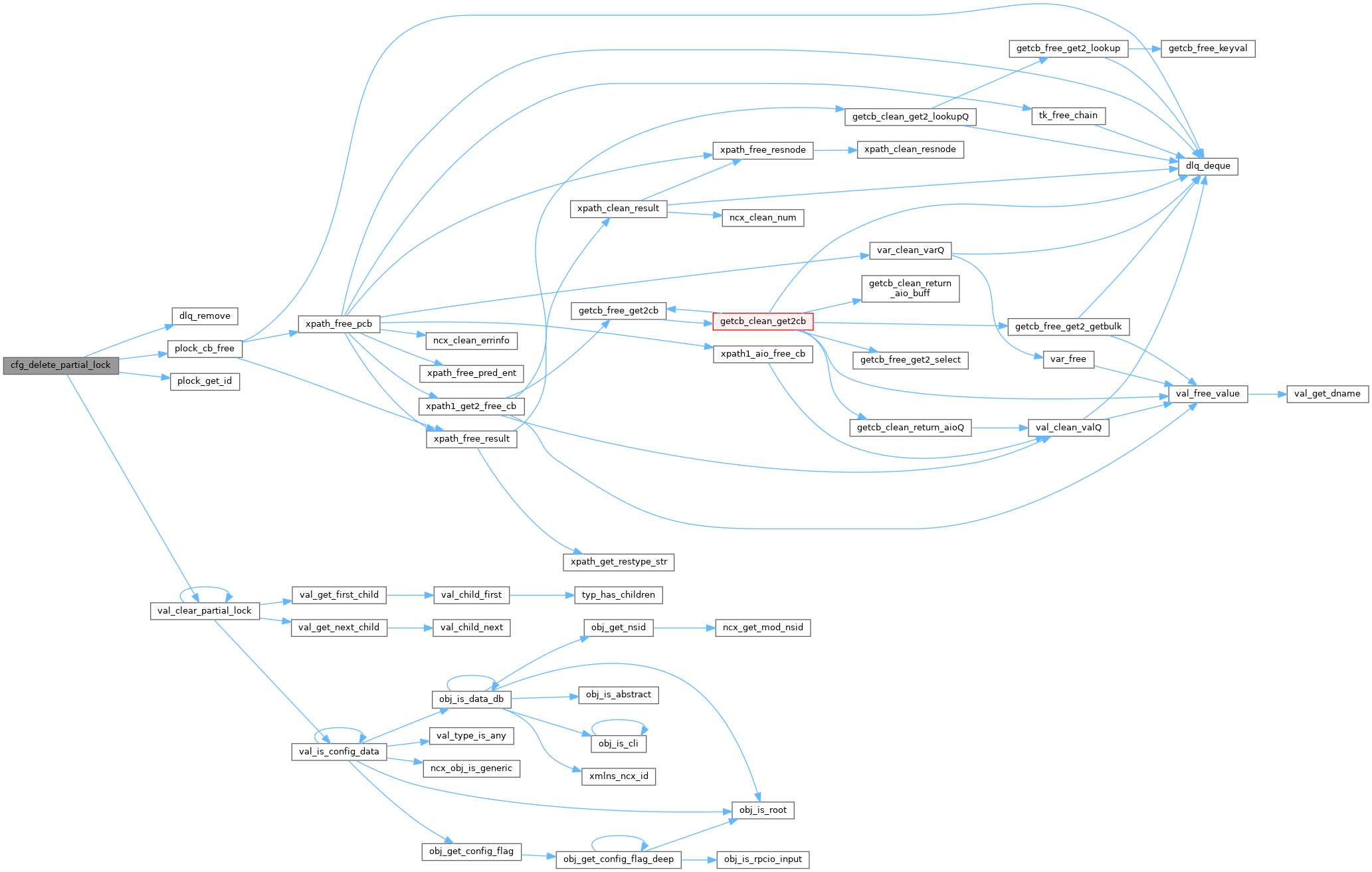
| status_t cfg_fill_candidate_from_inline | ( | ses_id_t | sesid, |
| val_value_t * | newroot | ||
| ) |
Fill the <candidate> config with the config contents of the <config> inline XML node.
Called internally only, do not use!
| sesid | current session ID |
| newroot | new root for the candidate config |
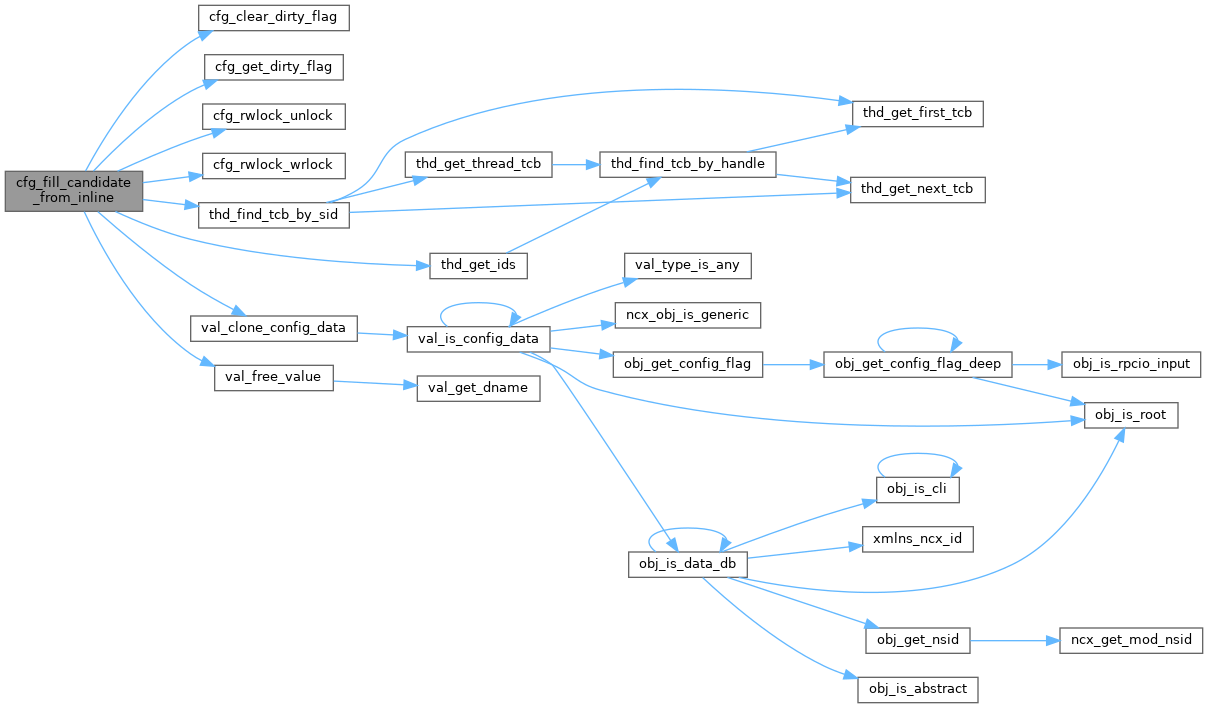
Fill the <candidate> config with the config contents of the <running> config.
| sesid | session ID setting the config |
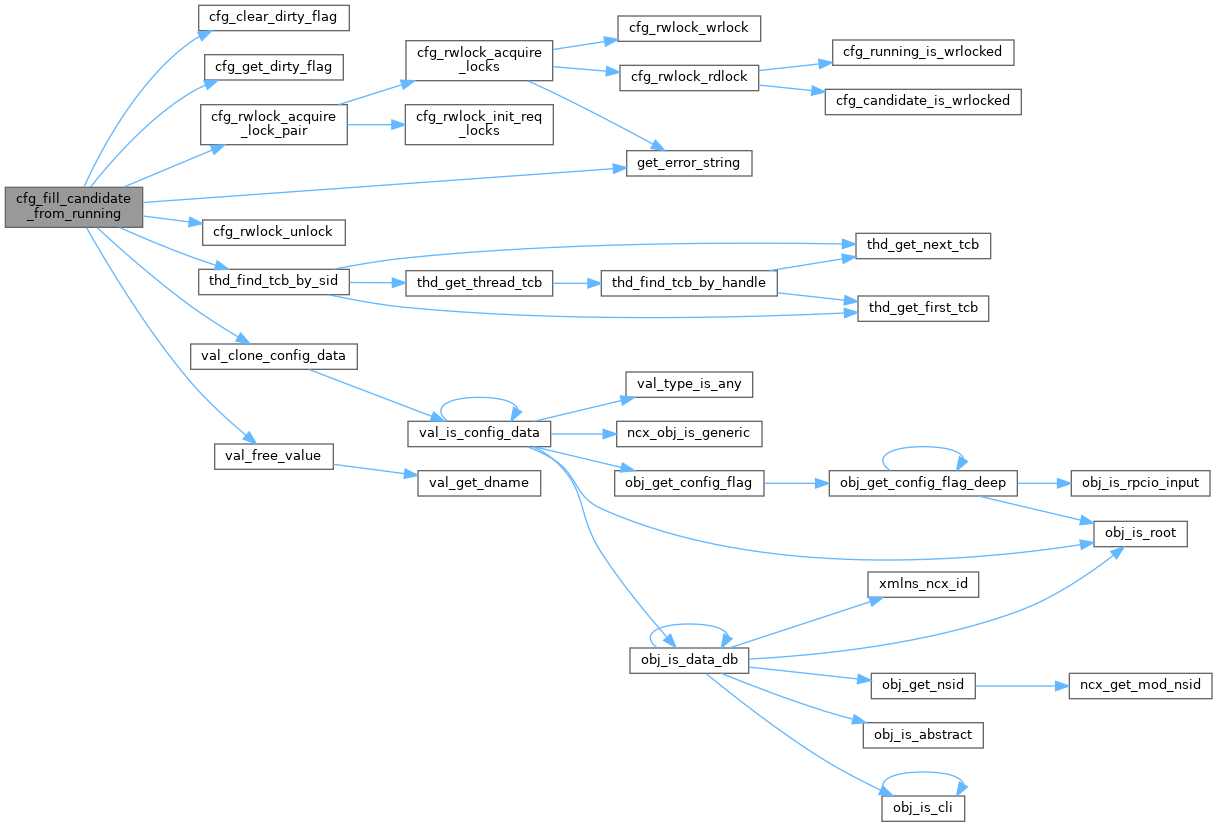

Fill the <candidate> config with the config contents of the <startup> config.
Called internally only, do not use!
| sesid | session ID setting the config |
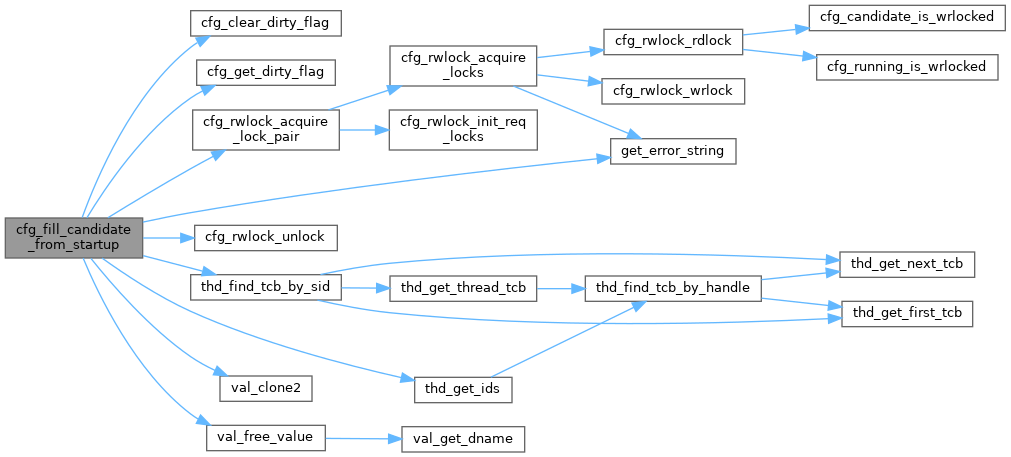
Fill the <operational> config with the config contents of the <running> config.
Called internally only, do not use!
| sesid | current session ID |
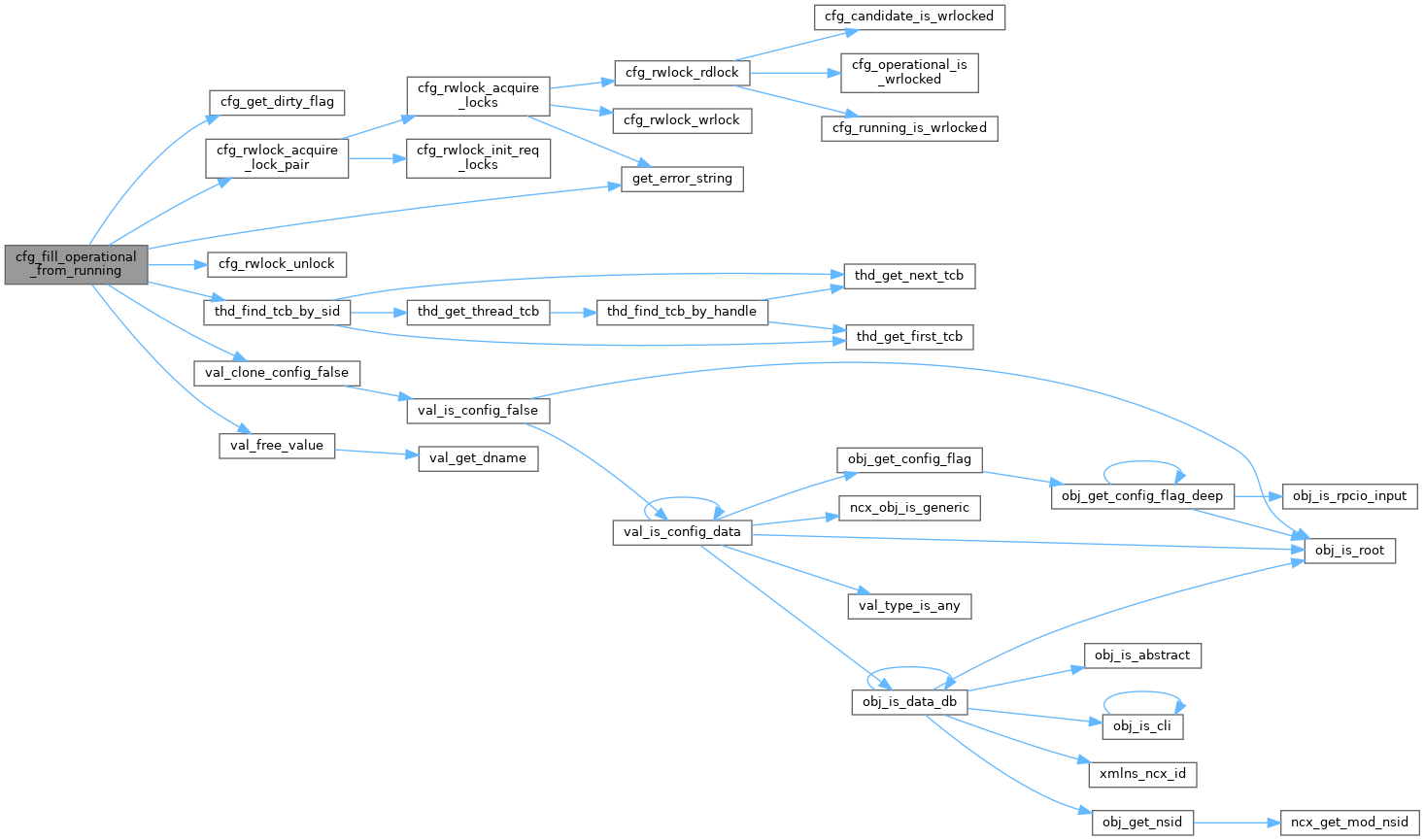
| plock_cb_t * cfg_find_partial_lock | ( | cfg_template_t * | cfg, |
| plock_id_t | lockid | ||
| ) |
Find a partial lock in the specified config.
| cfg | Config template to use |
| lockid | lock-id for the plcb to find |

| plock_cb_t * cfg_first_partial_lock | ( | cfg_template_t * | cfg | ) |
Get the first partial lock in the specified config.
| cfg | Config template to use |

| void cfg_free_template | ( | cfg_template_t * | cfg | ) |
Clean and free the cfg_template_t struct.
| cfg | cfg_template_t to clean and free |
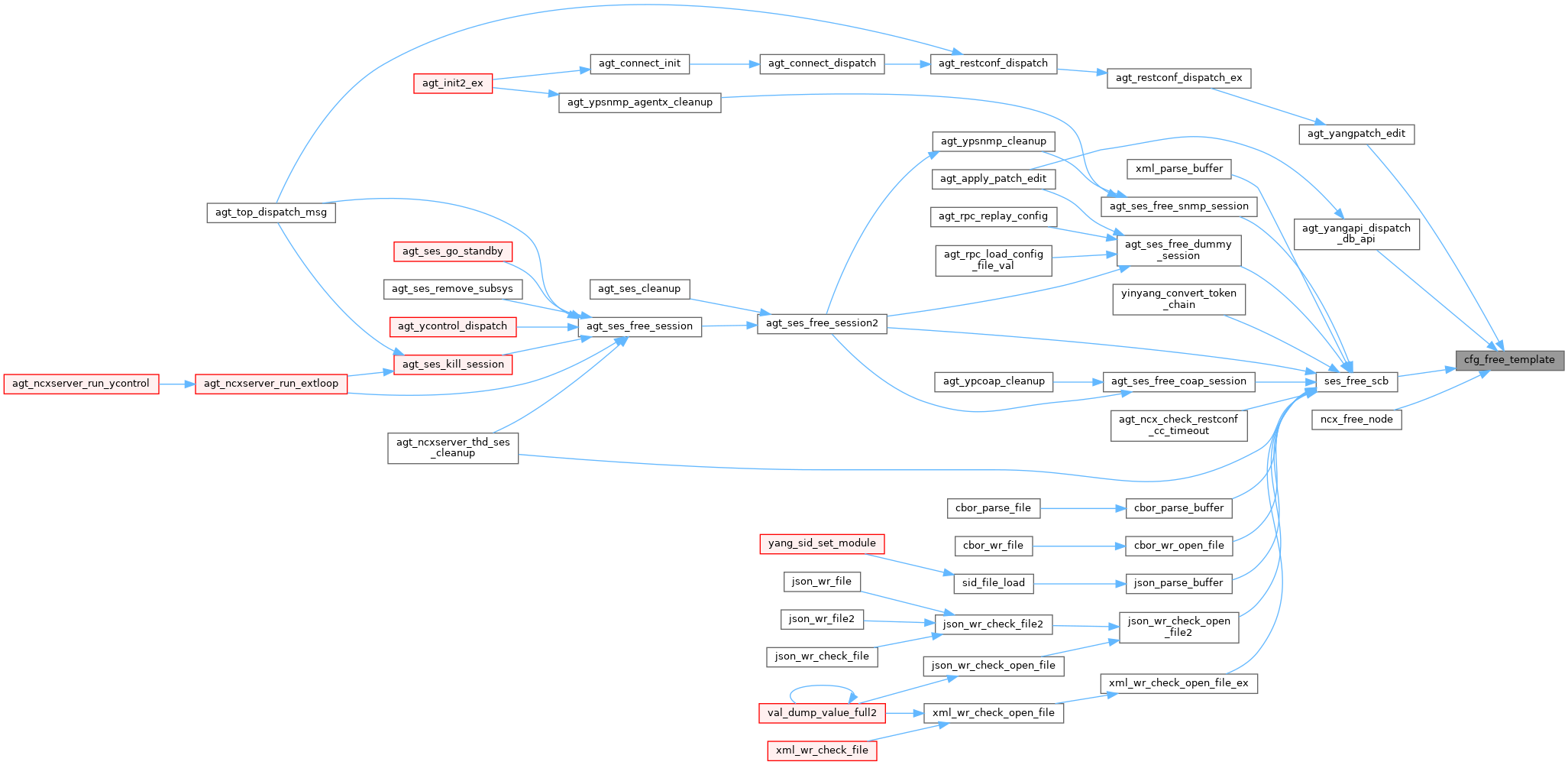
| cfg_template_t * cfg_get_config | ( | const xmlChar * | cfgname | ) |
Get the config struct from its name.
| cfgname | Config Name |
| cfg_template_t * cfg_get_config_id | ( | ncx_cfg_t | cfgid | ) |
Get the config struct from its ID.
| cfgid | config ID |
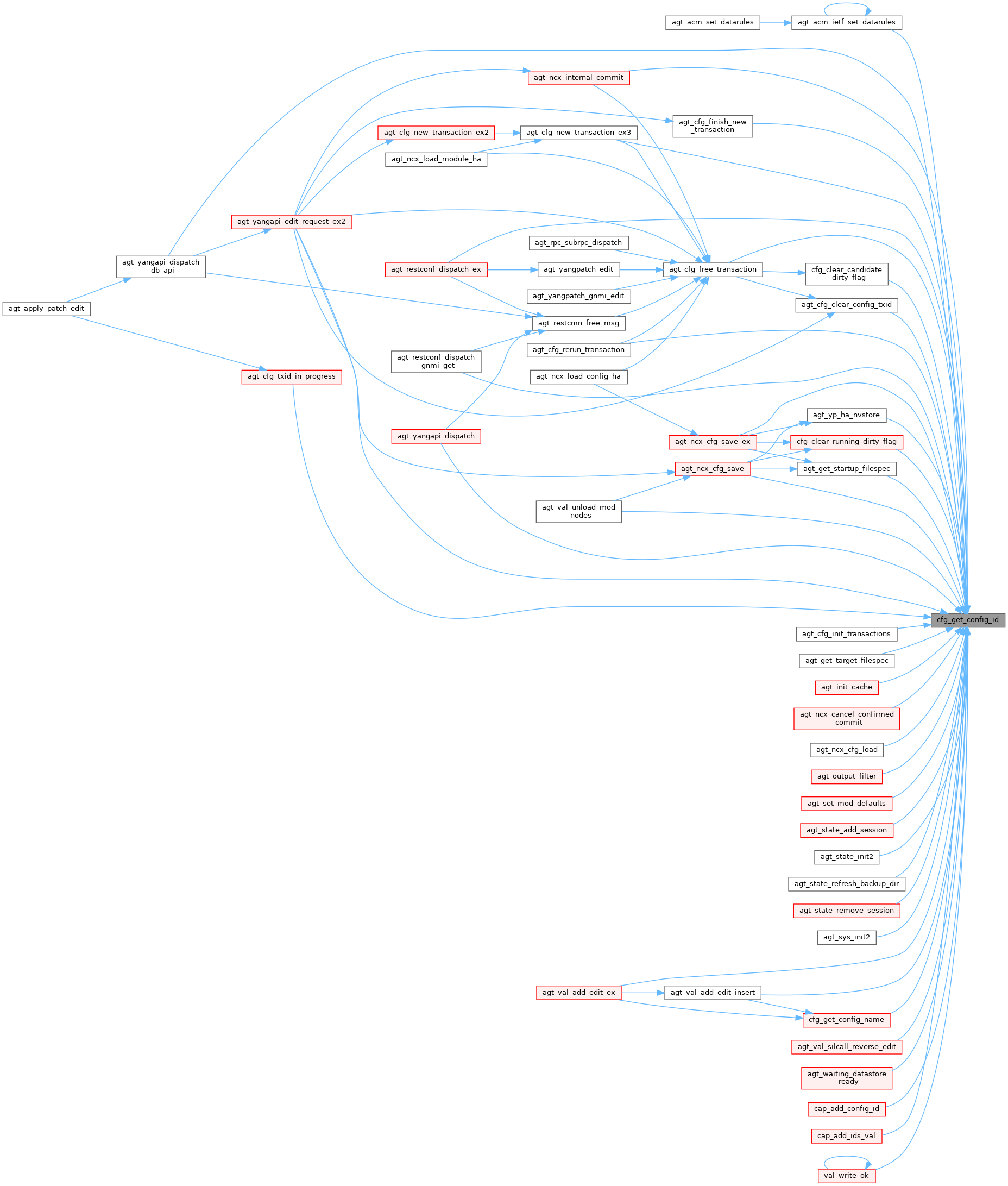
| const xmlChar * cfg_get_config_name | ( | ncx_cfg_t | cfgid | ) |
Get the config name from its ID.
| cfgid | config ID |


| boolean cfg_get_dirty_flag | ( | const cfg_template_t * | cfg | ) |
Get the config dirty flag value.
| cfg | configuration template to check |

| status_t cfg_get_global_lock_info | ( | const cfg_template_t * | cfg, |
| ses_id_t * | sesid, | ||
| const xmlChar ** | locktime | ||
| ) |
Get the current global lock info.
| cfg | Config template to check | |
| [out] | sesid | address of return session ID pointer
|
| [out] | locktime | address of return lock time
|
| const xmlChar * cfg_get_last_ch_time | ( | cfg_template_t * | cfg | ) |
Get the last-modified timestamp.
| cfg | config target |
| ncx_transaction_id_t cfg_get_last_txid | ( | cfg_template_t * | cfg | ) |
Get the last good transaction ID.
| cfg | config target |
| time_t cfg_get_lock_itime | ( | ncx_cfg_t | cfg_id | ) |
Get the lock_itime field.
| cfg_id | cfg ID |
| void cfg_get_lock_list | ( | ses_id_t | sesid, |
| val_value_t * | retval | ||
| ) |
Get a list of all the locks held by a session.
| sesid | session ID to check for any locks | |
| [out] | retval | pointer to malloced and initialized NCX_BT_SLIST
|
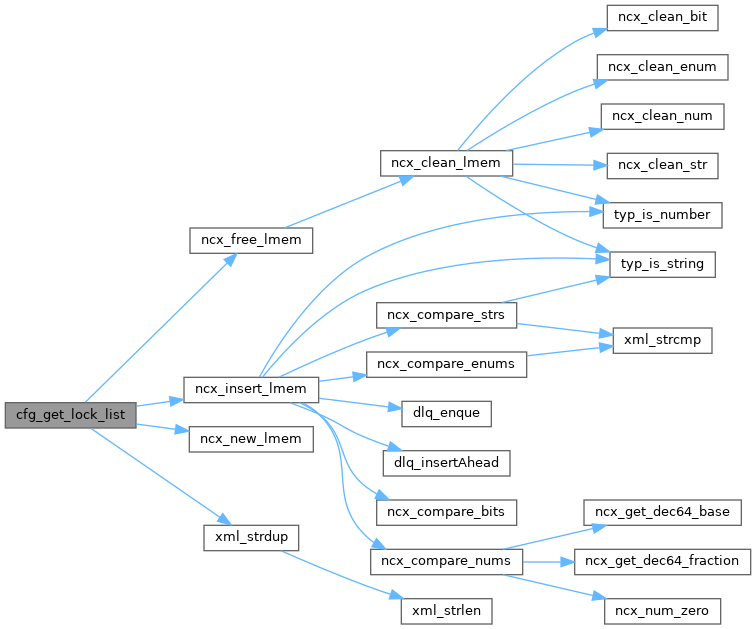
| val_value_t * cfg_get_root | ( | ncx_cfg_t | cfgid | ) |
Get the config root for the specified config.
| cfgid | config ID to get root from |
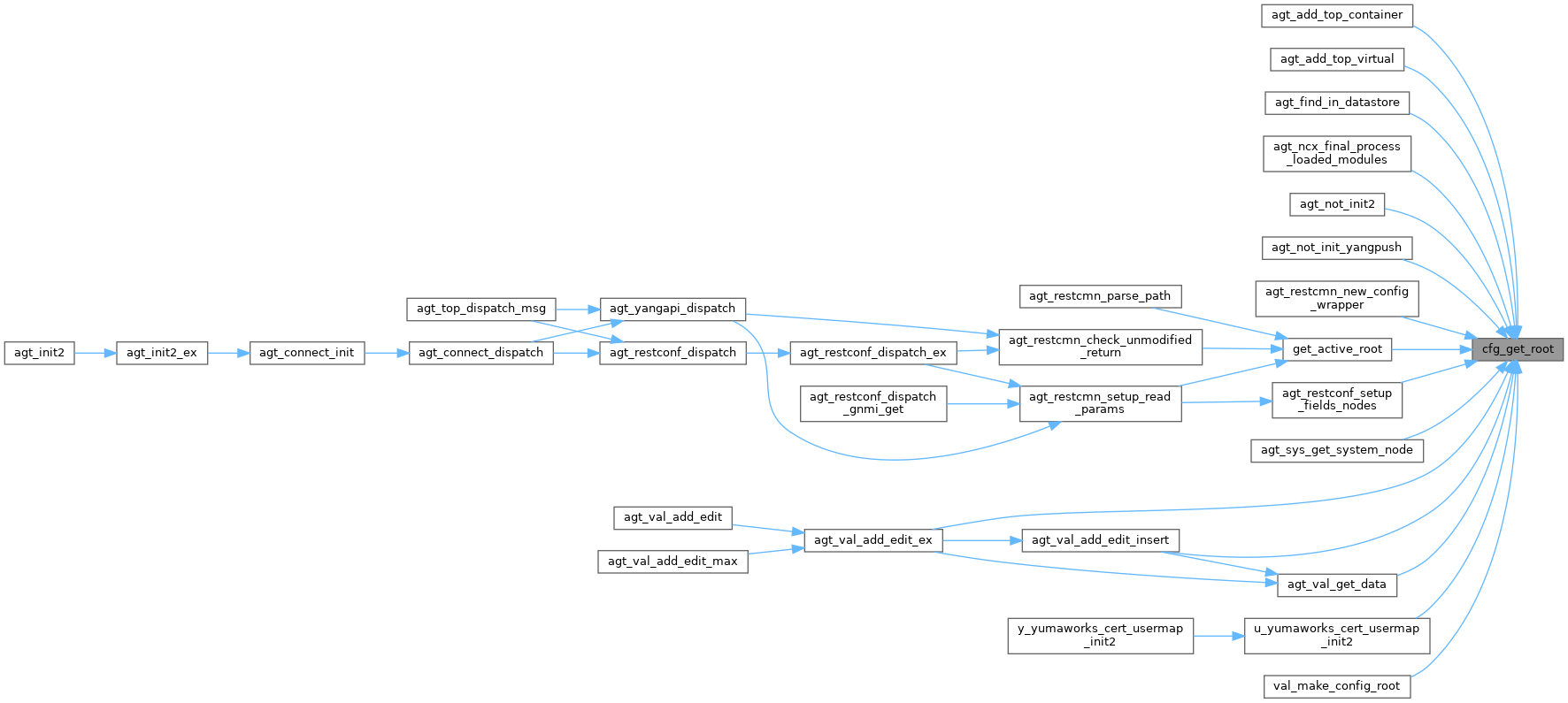
| const xmlChar * cfg_get_startup_filespec | ( | void | ) |
Get the filespec string for the XML file to save the running database.
| cfg_state_t cfg_get_state | ( | ncx_cfg_t | cfg_id | ) |
Get the state of the specified static config.
| cfg_id | Config ID |
Initialize the specified static configuration slot.
| cfg_id | cfg ID to intialize |


| boolean cfg_is_global_locked | ( | const cfg_template_t * | cfg | ) |
Check if the specified config has ab active global lock.
| cfg | Config template to check |
| boolean cfg_is_partial_locked | ( | const cfg_template_t * | cfg | ) |
Check if the specified config has any active partial locks.
| cfg | Config template to check |
| status_t cfg_lock | ( | cfg_template_t * | cfg, |
| ses_id_t | locked_by, | ||
| cfg_source_t | lock_src | ||
| ) |
Lock the specified config.
This will not really have an effect unless the CFG_FL_TARGET flag in the specified config is also set
| cfg | Config template to lock |
| locked_by | session ID of the lock owner |
| lock_src | enum classifying the lock source |

| status_t cfg_lock2 | ( | cfg_template_t * | cfg, |
| ses_id_t | locked_by, | ||
| cfg_source_t | lock_src, | ||
| boolean | lockall | ||
| ) |
Lock the specified config (with lockall)
This will not really have an effect unless the CFG_FL_TARGET flag in the specified config is also set
| cfg | Config template to lock |
| locked_by | session ID of the lock owner |
| lock_src | enum classifying the lock source |
| lockall | TRUE if from "<lock-all>"; FALSE otherwise |
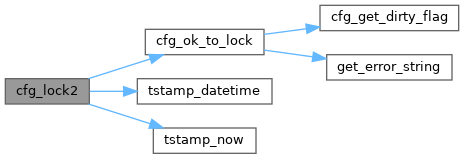

Force a cfg lock to be undone due to max-lock-hold-time.
| cfg_id | Config ID to force global lock released |
| locked_by | session ID of the lock owner |
| skip_reload | TRUE to skip reload/discard-changes on candidate |
| cfg_template_t * cfg_new_fake_candidate | ( | const xmlChar * | name, |
| ncx_cfg_t | cfg_id | ||
| ) |
Malloc and initialize a new fake Candidate cfg_template_t struct.
| name | cfg name |
| cfg_id | cfg ID |
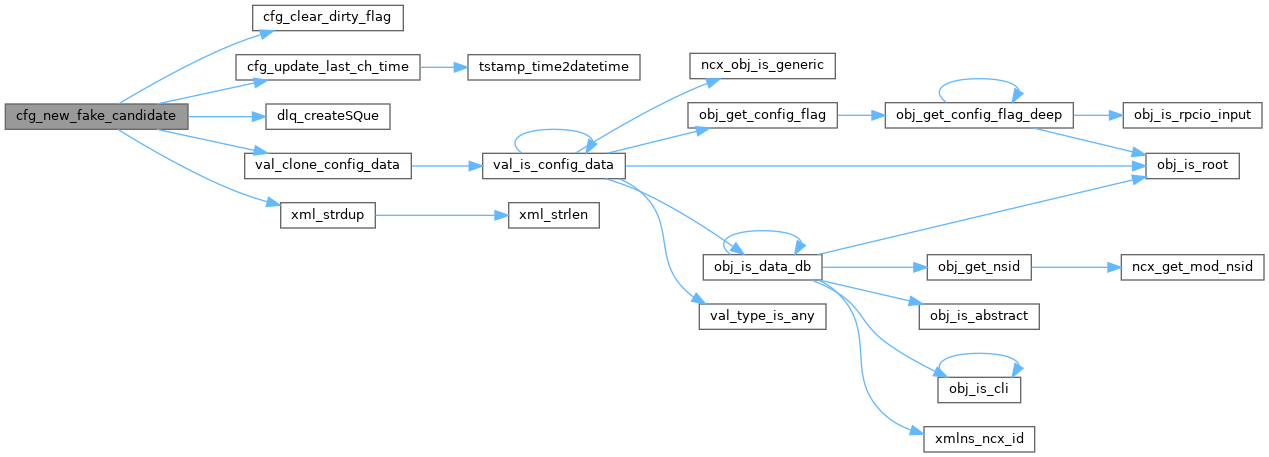

| cfg_template_t * cfg_new_fake_candidate2 | ( | const xmlChar * | name, |
| ncx_cfg_t | cfg_id, | ||
| val_value_t * | fake_root | ||
| ) |
Malloc and initialize a new fake Candidate with fake_root.
| name | cfg name |
| cfg_id | cfg ID |
| fake_root |
|
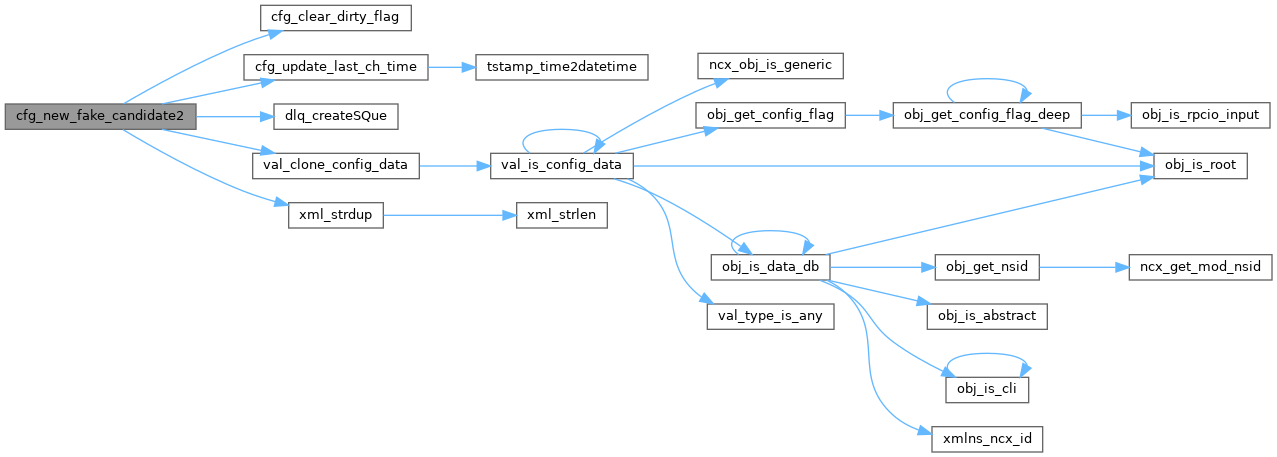

| cfg_template_t * cfg_new_template | ( | const xmlChar * | name, |
| ncx_cfg_t | cfg_id | ||
| ) |
Malloc and initialize a cfg_template_t struct.
| name | cfg name |
| cfg_id | cfg ID |

| plock_cb_t * cfg_next_partial_lock | ( | plock_cb_t * | curplockcb | ) |
Get the next partial lock in the specified config.
| curplockcb | current lock control block; get next CB |
| status_t cfg_ok_to_lock | ( | const cfg_template_t * | cfg | ) |
Check if the specified config can be locked right now for global lock only.
| cfg | Config template to check |


| status_t cfg_ok_to_partial_lock | ( | const cfg_template_t * | cfg | ) |
Check if the specified config can be locked right now for partial lock only.
| cfg | Config template to check |


| status_t cfg_ok_to_read | ( | const cfg_template_t * | cfg | ) |
Check if the specified config can be read right now.
| cfg | Config template to check |


| status_t cfg_ok_to_unlock | ( | const cfg_template_t * | cfg, |
| ses_id_t | sesid | ||
| ) |
Check if the specified config can be unlocked right now by the specified session ID; for global lock only.
| cfg | Config template to check |
| sesid | session ID requesting to unlock the config |

| status_t cfg_ok_to_unlock2 | ( | const cfg_template_t * | cfg, |
| ses_id_t | sesid, | ||
| boolean | lockall | ||
| ) |
Check if the specified config can be unlocked right now by the specified session ID; for global lock only.
Support for lock-all added
| cfg | Config template to check |
| sesid | session ID requesting to unlock the config |
| lockall | TRUE if from "<unlock-all>"; FALSE otherwise |


| status_t cfg_ok_to_write | ( | const cfg_template_t * | cfg, |
| ses_id_t | sesid | ||
| ) |
Check if the specified config can be written right now by the specified session ID.
This is not an access control check, only locks and config state will be checked
| cfg | Config template to check |
| sesid | session ID requesting to write to the config |
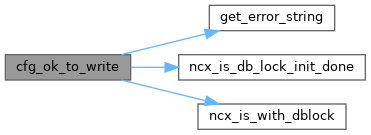

| boolean cfg_operational_is_wrlocked | ( | void | ) |
Check if the operational datastore is currently pthreads write-locked.
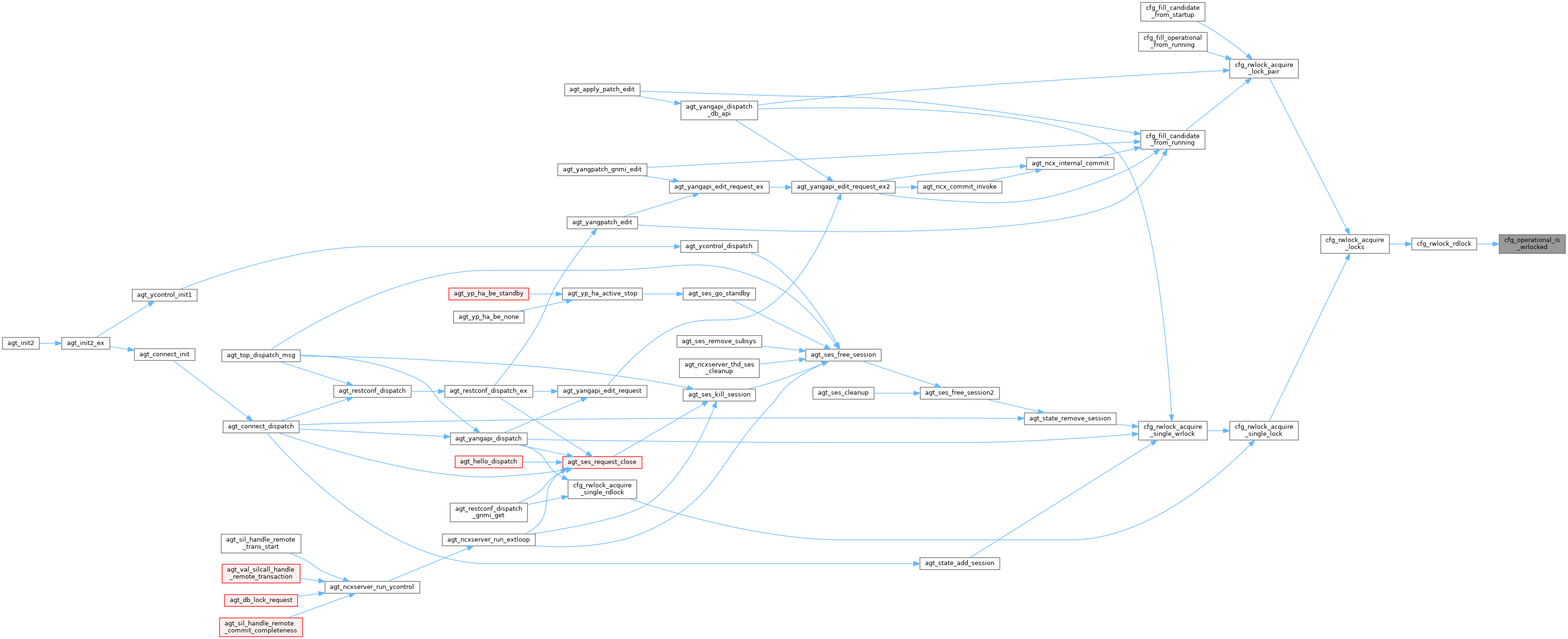
| void cfg_register_reload_candidate_cb | ( | cfg_reload_candidate_cb_t | cbfn | ) |
Register a callback function to be called anytime the.
cfg_fill_candidate_from_ FOO function is called This is an internal server callback – not a SIL callback
| cbfn | callback function to register |
| void cfg_release_locks | ( | ses_id_t | sesid | ) |
Release any configuration locks held by the specified session.
| sesid | session ID to check for |
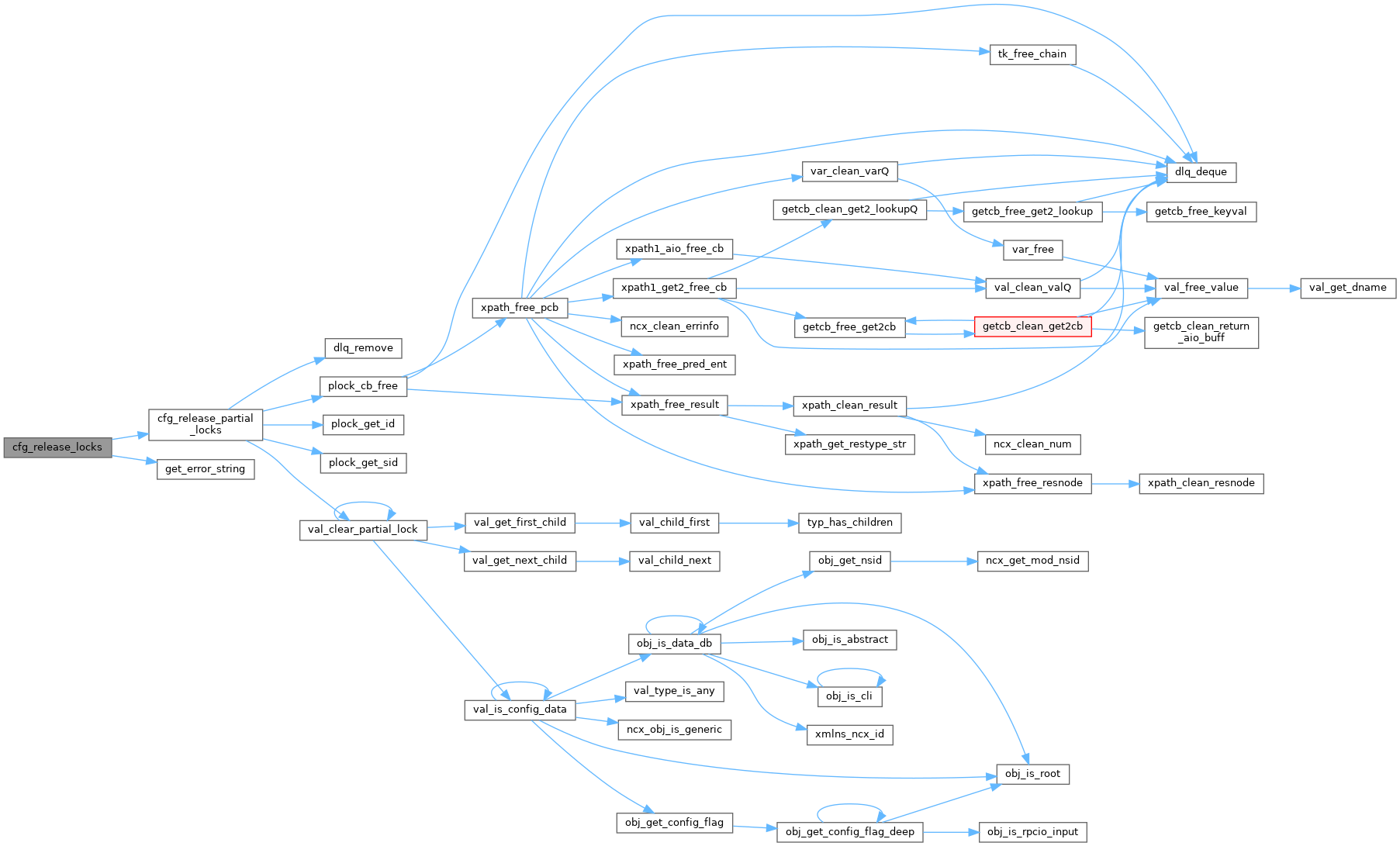

| void cfg_release_partial_locks | ( | ses_id_t | sesid | ) |
Release any configuration locks held by the specified session.
| sesid | session ID to check for |
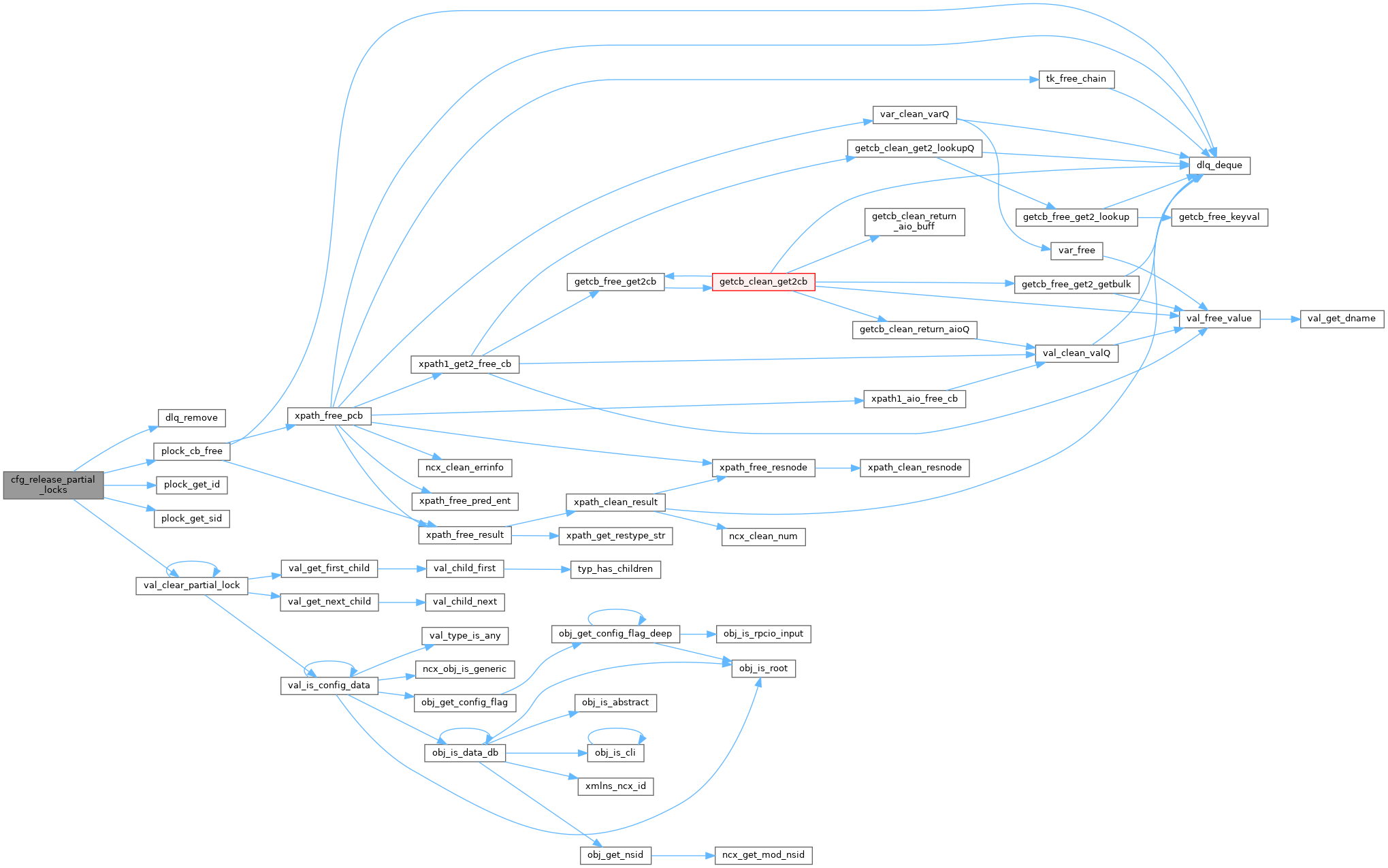

| boolean cfg_running_is_wrlocked | ( | void | ) |
Check if the running datastore is currently pthreads write-locked.
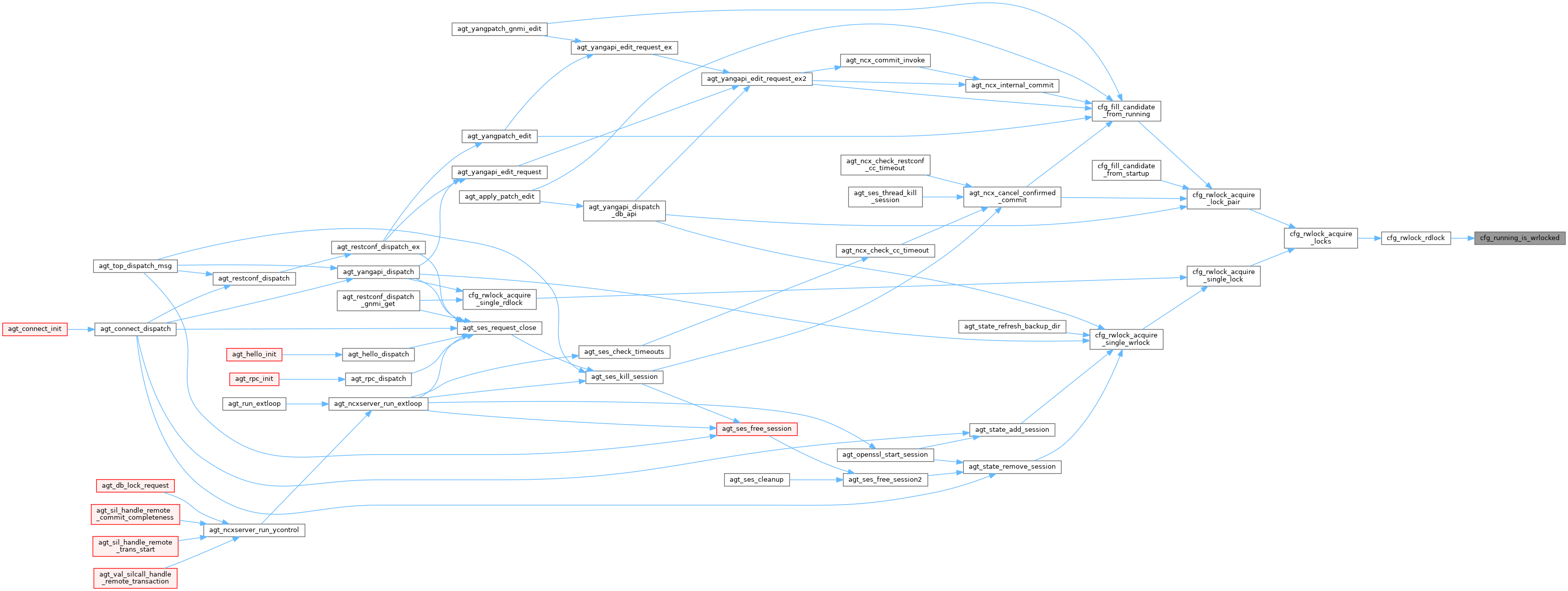
| status_t cfg_rwlock_acquire_lock_pair | ( | thd_tcb_t * | tcb, |
| cfg_template_t * | cfg1, | ||
| boolean | wrlock1, | ||
| cfg_template_t * | cfg2, | ||
| boolean | wrlock2 | ||
| ) |
Acquire multiple (2) locks in predetermined, repeatable in order to help prevent deadlock.
| tcb | thread control block for session (caller) |
| cfg1 | config ptr 1 |
| wrlock1 | TRUE => write lock ELSE read lock |
| cfg2 | config ptr 2 |
| wrlock2 | TRUE => write lock ELSE read lock |


Acquire multiple locks in order to help prevent deadlock.
| tcb | thread control block for session (caller) |

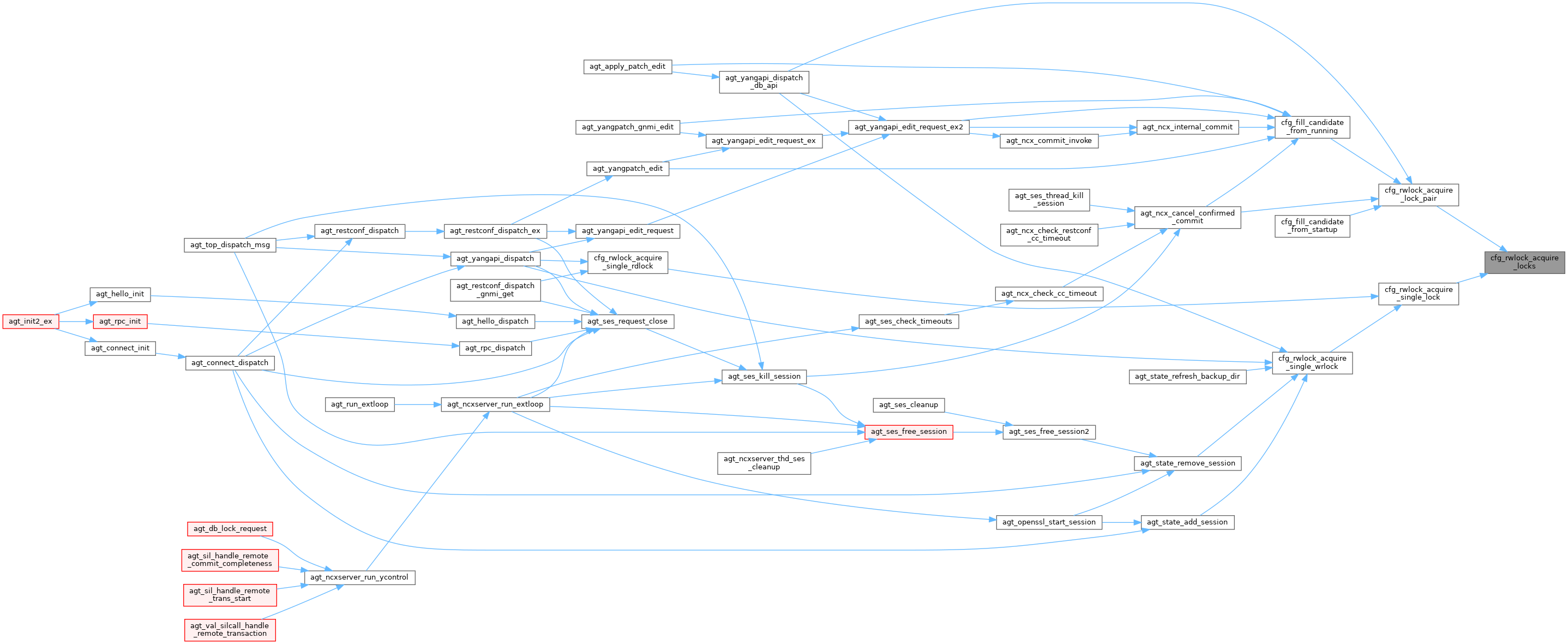
| status_t cfg_rwlock_acquire_single_lock | ( | thd_tcb_t * | tcb, |
| cfg_template_t * | cfg, | ||
| boolean | wrlock | ||
| ) |
Acquire a single RWLOCK.
NOTE: Call once only. Do NOT use this to acquire multiple locks.
| tcb | thread control block for session (caller) |
| cfg | data store |
| wrlock | TRUE == write access requested |


| status_t cfg_rwlock_acquire_single_rdlock | ( | thd_tcb_t * | tcb, |
| cfg_template_t * | cfg | ||
| ) |
Acquire a single RWLOCK for read access.
NOTE: Call once only per RPC. Do NOT use this to acquire multiple locks.
| tcb | thread control block for session (caller) |
| cfg | data store |


| status_t cfg_rwlock_acquire_single_wrlock | ( | thd_tcb_t * | tcb, |
| cfg_template_t * | cfg | ||
| ) |
Acquire a single RWLOCK for write access.
NOTE: Call once only per RPC. Do NOT use this to acquire multiple locks.
| tcb | thread control block for session (caller) |
| cfg | data store |


Initialize TCB multiple lock structure.
WARNING: Will attempt to unlock (and generate error message) but should NOT be called for this purpose.
| tcb | thread control block for session (caller) |
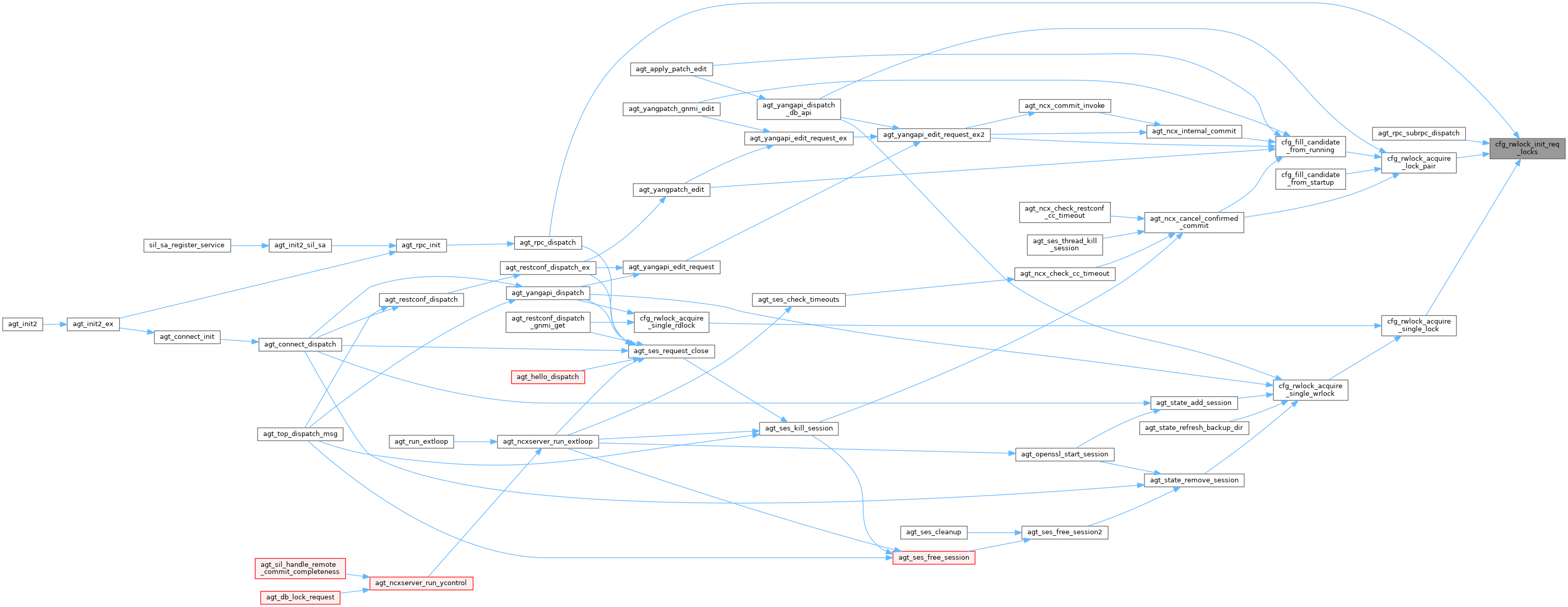
| status_t cfg_rwlock_rdlock | ( | thd_tcb_t * | tcb, |
| cfg_template_t * | cfg | ||
| ) |
Take out the read lock associated with a cfg (datastore) RWLOCK structure May be called recursively.
| tcb | thread control block for session (caller) |
| cfg | datastore descriptor (e.g., running, candidate, or startup) |

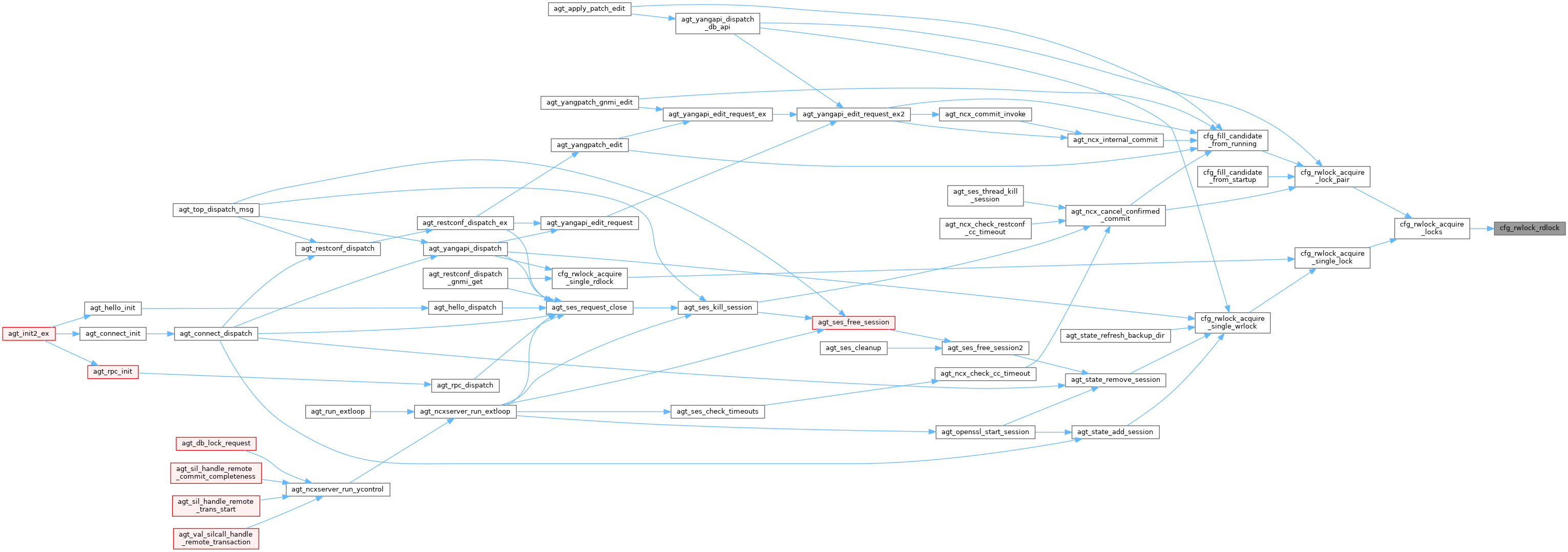
Release all RWLOCKs recorded in TCB lock state structure.
| tcb | thread control block for session (caller) |

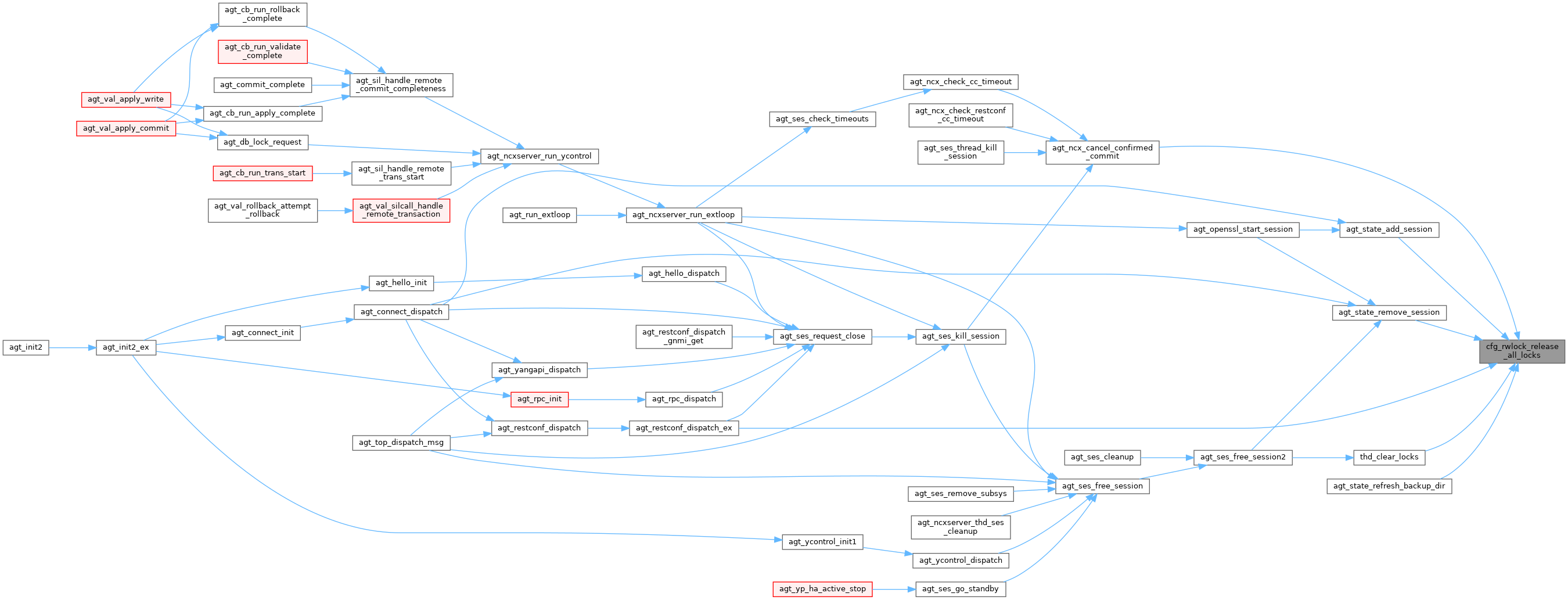
| status_t cfg_rwlock_unlock | ( | thd_tcb_t * | tcb, |
| cfg_template_t * | cfg | ||
| ) |
Release a lock associated with a cfg (datastore) RWLOCK structure.
May be called recursively.
| tcb | thread control block for session (caller) |
| cfg | datastore descriptor (e.g., running, candidate, or startup) |
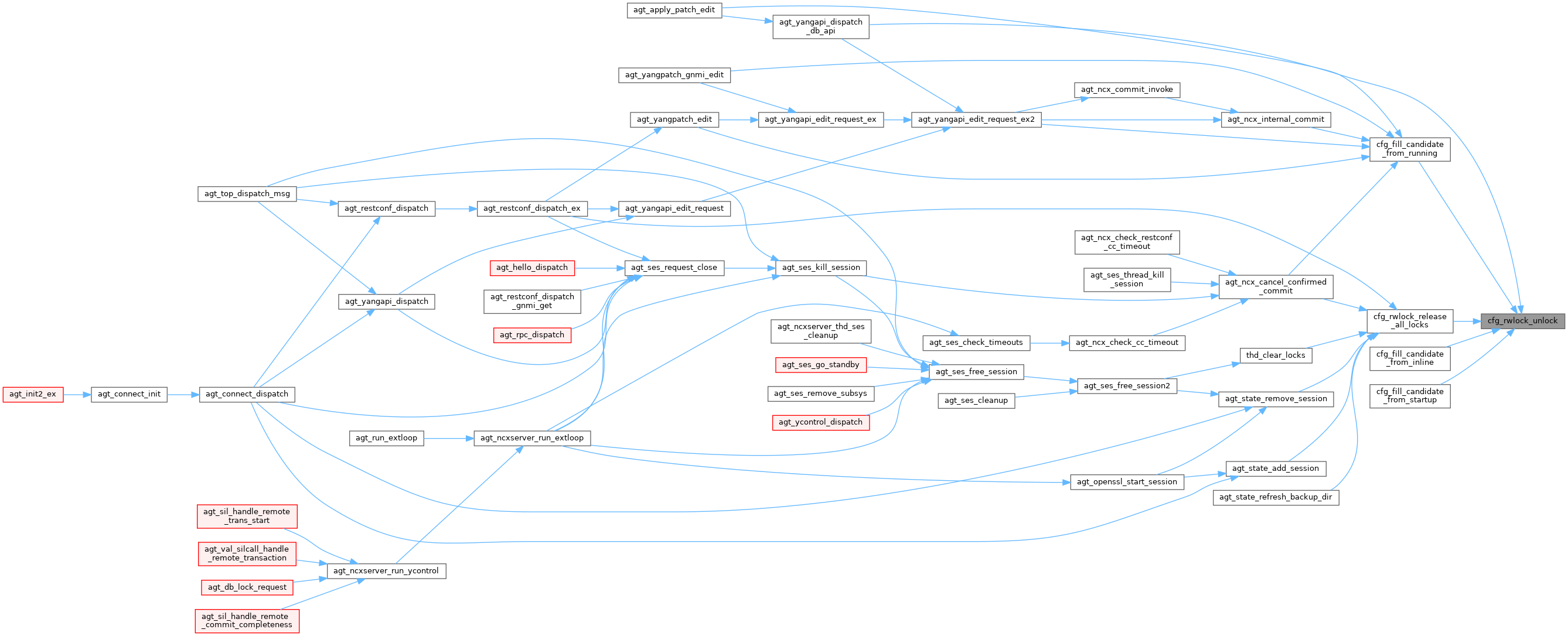
| status_t cfg_rwlock_wrlock | ( | thd_tcb_t * | tcb, |
| cfg_template_t * | cfg | ||
| ) |
Take out a write lock associated with a cfg (datastore) RWLOCK structure.
May be called recursively.
| tcb | thread control block for session (caller) |
| cfg | datastore descriptor (e.g., running, candidate, or startup) |
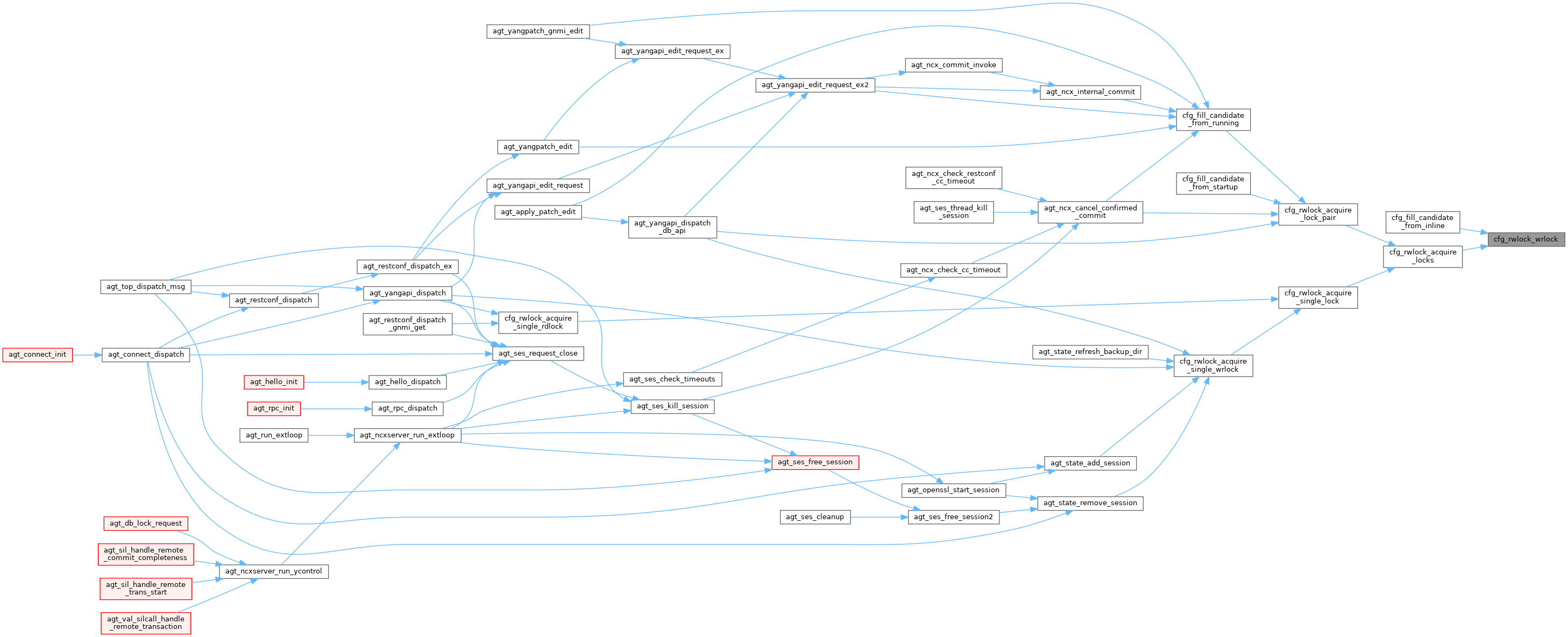
| void cfg_set_defer_load | ( | boolean | val | ) |
Set the config defer load flag to the config.
| val | TRUE if this config is in defer load mode; FALSE if not |

| void cfg_set_dirty_flag | ( | cfg_template_t * | cfg | ) |
Mark the config as 'changed'.
| cfg | configuration template to set |
| void cfg_set_state | ( | ncx_cfg_t | cfg_id, |
| cfg_state_t | new_state | ||
| ) |
Change the state of the specified static config.
| cfg_id | Config ID to change |
| new_state | new config state to set |
| void cfg_set_target | ( | ncx_cfg_t | cfg_id | ) |
Set the CFG_FL_TARGET flag in the specified config.
| cfg_id | Config ID to set as a valid target |
Setup the running config root if load_running_config did not add anything.


| status_t cfg_sprintf_etag | ( | cfg_template_t * | cfg, |
| xmlChar * | buff, | ||
| int32 | buffsize | ||
| ) |
Write the Entity Tag for the datastore to the specified buffer.
| cfg | cfg_templatet data structure to use | |
| [out] | buff | buffer to use
|
| buffsize | buffer size to use |


| status_t cfg_sprintf_etag_id | ( | ncx_transaction_id_t | id, |
| xmlChar * | buff, | ||
| int32 | buffsize | ||
| ) |
Write the Entity Tag for the datastore to the specified buffer Use the last_id instead of the cfg template.
| id | cfg id to use | |
| [out] | buff | buffer to use
|
| buffsize | buffer size to use |


| status_t cfg_unlock | ( | cfg_template_t * | cfg, |
| ses_id_t | locked_by | ||
| ) |
Unlock the specified config.
| cfg | Config template to unlock |
| locked_by | session ID of the lock owner |
| status_t cfg_unlock2 | ( | cfg_template_t * | cfg, |
| ses_id_t | locked_by, | ||
| boolean | lockall | ||
| ) |
Unlock the specified config (2nd rev)
| cfg | Config template to unlock |
| locked_by | session ID of the lock owner |
| lockall | TRUE if called from <unlock-all>; FALSE otherwise |
| status_t cfg_unlock_ex | ( | cfg_template_t * | cfg, |
| ses_id_t | locked_by, | ||
| boolean | skip_reload | ||
| ) |
Unlock the specified config.
Do not always force a remove changes. This is needed for the <unload> operation which locks the datastores while deleting data nodes and schema nodes for the module being unloaded
| cfg | Config template to unlock |
| locked_by | session ID of the lock owner |
| skip_reload | TRUE to skip cfg reload test |
| void cfg_update_last_ch_time | ( | cfg_template_t * | cfg, |
| time_t * | timestamp | ||
| ) |
Update the last-modified timestamp.
| cfg | config target |
| timestamp | timestamp to use or NULL to get cvurrent time |


| void cfg_update_last_txid | ( | cfg_template_t * | cfg, |
| ncx_transaction_id_t | txid | ||
| ) |
Update the last good transaction ID.
| cfg | config target |
| txid | trnasaction ID to use |

| void cfg_update_stamps | ( | cfg_template_t * | source, |
| cfg_template_t * | dest | ||
| ) |
Update the last-modified and last-txid stamps.
| source | source config |
| dest | destoination config |


| void cfg_ypinit | ( | void | ) |
Initialize the config manager.
YPW-1360: netconfd: naming issue in ncx module (cfg.c cfg_init() API) changed function name cfg_init to cfg_ypinit.
